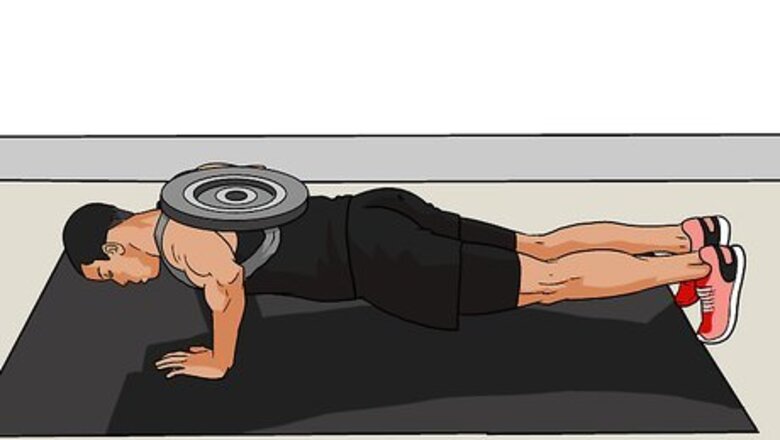
views
Building Your Chest and Abs
Do bench presses. This is the best exercise you can do to start building up your chest. To do it, you'll need a weight bench and a barbell or some dumbbells. (At the gym, you can also use a bench press machine.) Select a weight you can lift 5 to 7 times before needing to rest. Don't worry if the weight seems low - that doesn't matter right now. What matters is that you lift enough to build your muscles, and that number is different for different people. You'll add more weight as you get stronger. However, in order to build a big chest, your goal should be to lift at least your bodyweight. Here's how to do a bench press: Lie on your weight bench on your back, with your feet firmly planted on the floor. Hold the barbell over your chest, with your hands spaced evenly apart. Push the barbell toward the ceiling until your arms are straight. Lower the bar until it touches your chest. Repeat until you've lifted the weight 5 to 7 times. Rest for a minute, then do 2 more sets.
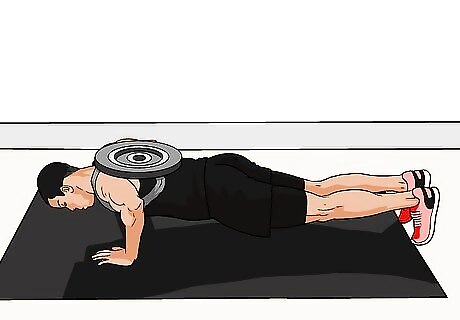
Do weighted pushups. Doing regular push ups with proper form and breathing techniques is one of the simplest, and best exercises you can do for your chest, but weighted pushups puts extra strain on your muscles that encourages them to break down, then build up stronger, but is not recommended for just starting out, as it could result in muscle tears and other injuries, that will only set you back from accomplishing your fitness goals. To do weighted pushups, strap on a weight to increase the weight of your torso. Do 3 sets of 15 pushups per workout. If you find it easy to do more than 15 at a time, add more weight. You can also make the standard pushup tougher by doing rotating pushups and lifting dumbbells at the same time. Start in a regular pushup position, but instead of having your palms on the ground, hold a dumbbell in each hand. Lower your body to the floor, then push up up with one hand and raise the other toward the sky, rotating your body sideways as you do so. Lower it to the floor and push down again, then push up with the other hand and rotate in the other direction.
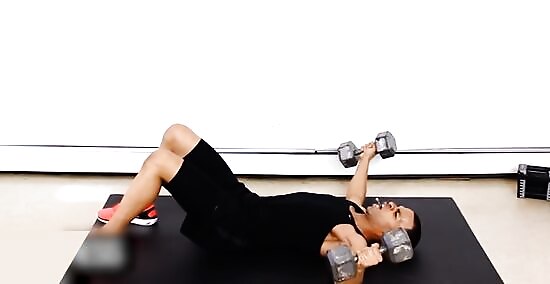
Do flyes. Another great chest exercise is flyes, for which you'll need either a set of dumbbells or a cable station. This motion activates your pec muscles and helps break them down to build them back up. Since this movement is mechanically a little more difficult than the bench press, it's recommended that you use lighter weights. Lie on your back grasping either your dumbbells or the cables (if you're using a cable station). Extend your arms straight toward the ceiling. Lower your hands to either side of your body, so that your arms are spread like eagles' wings. Return to starting position, then repeat. Do 3 sets of 10 or so reps.
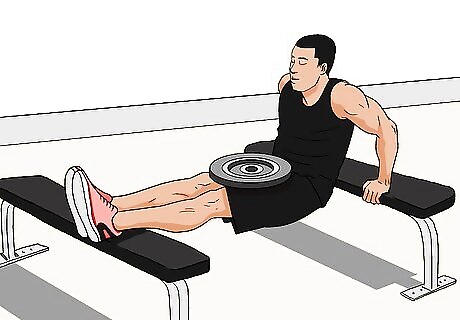
Do weighted dips. You'll need two exercise benches. Try this exercise first without the weight and work your way up to doing it with weight added. Place your hands on one bench, and rest your crossed feet on the other. Your butt and thighs should be positioned over the gap between the benches. Once you have mastered the dip, you can begin to place a weight across your thighs. Make sure it's secure before you begin. Keeping your back straight, "dip" your torso and butt into the gap by lowering yourself with your arms. Bend your elbows and lower yourself so that your elbows align with your shoulders, pointing straight backward. Straighten your arms to lift yourself back up. Do 3 sets of 10 or so reps.
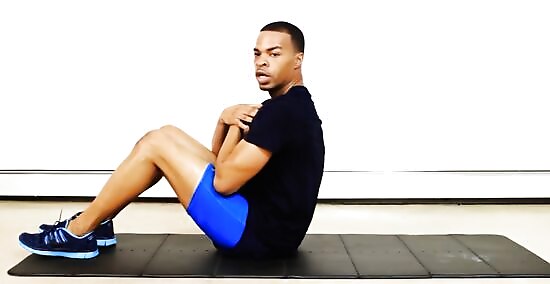
Do weighted crunches. Take this classic abs exercise up a notch by adding some weight. Crunches might be boring, but they're still one of the best ways to get your abs toned and cut. Make sure you're using the right form: Lie on the floor with your knees bent and your feet comfortably planted on the floor. Hold a weight over your chest. Don't make it too heavy; you should be able to do about 12 - 15 crunches before stopping. Use your ab muscles to lift your torso and head forward so that your shoulders lift from the floor. Don't lift your entire back off the floor; you could strain it, and lifting it doesn't give you any sort of advantage in terms of building abs. Lower back to the floor, then repeat. Do 3 sets of 15 crunches. Mix it up sometimes by doing side crunches; get in the same position you use for regular crunches, but crunch to one side or the other. This works out your obliques, the muscles on either side of your abs.
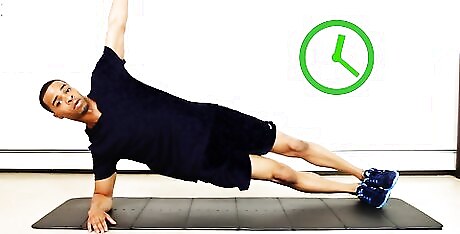
Do planks. This exercise engages all of your abdominal muscles at once, and no equipment is required. Make it part of every ab workout you do and you'll start seeing a difference. Here's how to do a plank: Lie on the floor stomach-down, with your legs stretched straight. Lift yourself up onto your forearms. Keep your elbows in a straight line with your shoulders, and point your fingers straight ahead. Lift up onto your tiptoes, so that your legs and torso aren't touching the ground. Keep your back straight. Hold the position for as long as you can - at least a minute. Tighten those ab muscles. Relax on the floor, then repeat. You can do side planks as well, to work out your obliques. Raise yourself up on just one forearm, turn your body sideways, and lift the other arm straight toward the ceiling. Hold the position, then repeat on the other side. EXPERT TIP Planks work your chest by forcing your pectorals to help support your body weight. Michele Dolan Michele Dolan Certified Fitness Trainer Michele Dolan is a BCRPA certified Personal Trainer in British Columbia. She has been a personal trainer and fitness instructor since 2002. Michele Dolan Michele DolanCertified Fitness Trainer
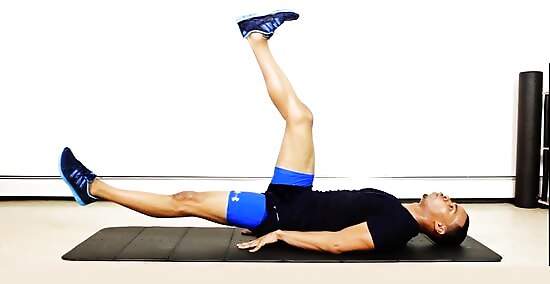
Do weighted leg lifts. Strap leg weights around your ankles before beginning this exercise. Lie on your back with your arms at your sides and your legs straight. Keeping your legs together and your back against the ground, lift your legs up until they reach a 90 degree angle with the floor. Make sure they're straight. Lower them back to the floor. Do 3 sets of 12 leg lifts. You can use an exercise ball instead of leg weights; simply hold it between your feet when you lift your legs.
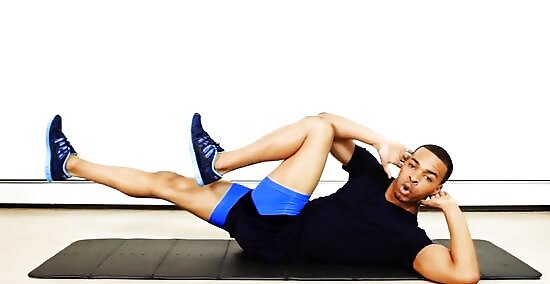
Do bicycle crunches for your lower abs. Again, using some weights will make this exercise more effective. Lie on your back with your knees and your feet on the floor. Straighten your left leg, keeping the other one bent. Bring your left elbow to your right knee by twisting it across your body. Repeat with your right elbow and left knee.
Working Out With a Mission
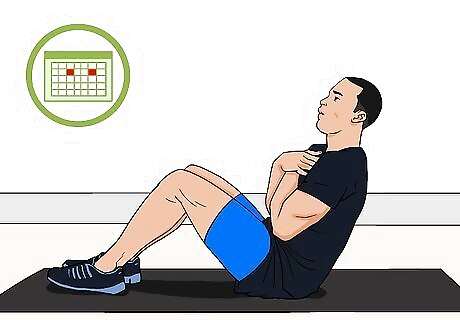
Work your pecs and abs twice a week. Don't work out any one muscle group more than twice a week. Your muscles need time to rest and repair in between workout sessions - that's when they build and get stronger. You can work your pecs and abs on the same days, or alternate days. Either way will be just as effective. Set a schedule for yourself so you never skip a workout. Committing to your workout regimen will increase your chances of success.
Work out as hard as you can. When your aim is to build muscle, it's important to put your best effort into every workout. Do your best to complete each exercise using the proper form, and make every crunch, bench press or leg lift as high-intensity as possible. Anything less than your best effort isn't going to give you the results you want. Your workout sessions should be about 30 minutes long. During that time, go all in - don't take a lot of long breaks. Maximize your time in the gym. Don't work out so hard that you end up injuring yourself. Your exercises will not be comfortable, but you shouldn't be in any kind of extreme pain. If you do feel excruciating pain, stop immediately. Focus on quality over quantity. It's better to do 10 slow crunches with good form than 20 fast crunches with bad form.
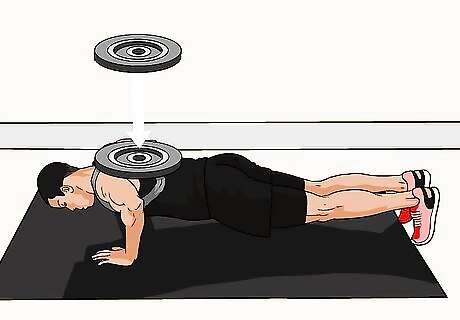
Superset two or more exercises. This means doing one type of exercise right after another without a break in between. Supersets make your muscles work harder, and can be an effective way to build muscle fast. For example, immediately follow your bench press with a few sets of pushups.
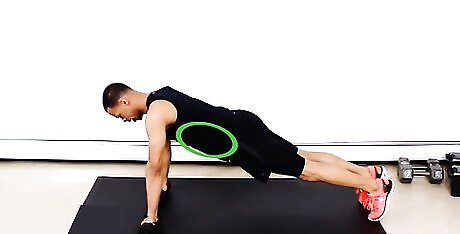
Tense your abs when you work out your pecs. This is called bracing your core. When lifting heavy weights you should always tighten your abdomen to avoid back injury. This has two additional positive effects on your workout. First, you end up strengthening your abs as you work out your pecs. Second, tensing your core will give you a lot more power during your pecs exercises. This will help you see results much faster than if you don't pay attention to your abs during your pecs workouts.
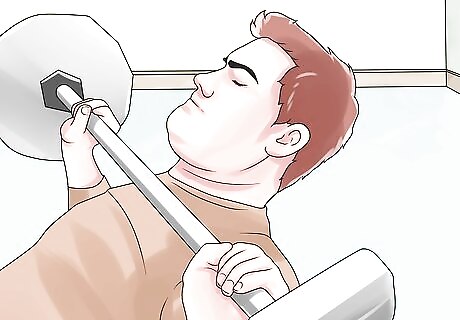
Add weight as you gain strength. You'll end up plateauing if you don't. Once you find you're able to easily bench a certain weight for more than 10 reps, it's time to add more weight. Same goes for all the other weighted exercises - when you can lift more than the recommended amount of reps without feeling the burn, add weight to keep the pressure on your muscles to continue building. Don't be tempted to add more weight than you can handle. You could injure yourself - completely negating all your hard efforts - if you try to lift too much. If a certain amount of weight is too heavy to lift more than 5 times before giving out, you're lifting too much.
Vary your exercises for your abdomen. Your muscles could get bored of doing crunches and start to plateau. Do new exercises to work your abs at every possible spot. For instance, you could do the wood chop, plank and reverse crunch for one week, and knees up crunches, Russian twists and side planks the other week.
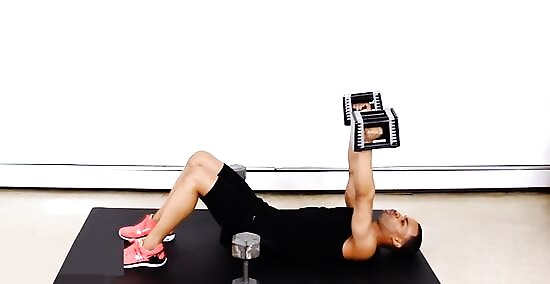
Don't forget your other muscle groups. Working out your entire body is key when you're trying to build muscle. If you neglect your legs, back and arms, your pecs and abs won't get as strong. Plus, you don't want to have a really muscular upper body with really skinny legs. It is very important to balance chest work with back work to prevent muscle imbalances, a rounded chest, or spinal misalignment. Lat pull downs, chin-ups, superman exercises, and rows are all good exercises to work your back as well.
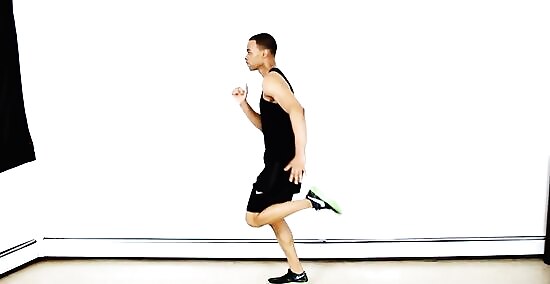
Do cardio sparingly. Perform cardiovascular exercise, like running, biking and swimming, no more than a few times a week. Your body needs to burn fat so that your abs will be visible, and cardio will help with full-body weight loss. However, doing too much cardio will use up the energy that you need to spend on building your muscles. Doing cardio no more than a couple times a week is best. The minimum amount of recommended cardio is 150 minutes of moderate exercise or 75 minutes of vigorous cardio exercise a week.
Employing Healthy Habits for Better Results
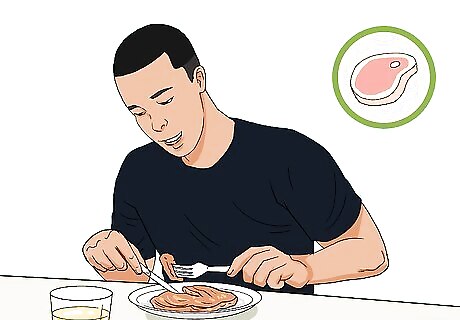
Eat lots of protein. Protein is the main muscle builder in your food, so eat plenty, but not so much that you cut out carbohydrates, fat and other body fuels. Protein should be the foundation of each of your meals when you're trying to build muscle. Choose hormone-free meat whenever possible. Eat lean beef, chicken, pork, fish, and other healthy protein sources, like eggs and tofu. Protein supplements, like creatine, can help muscle building as well.
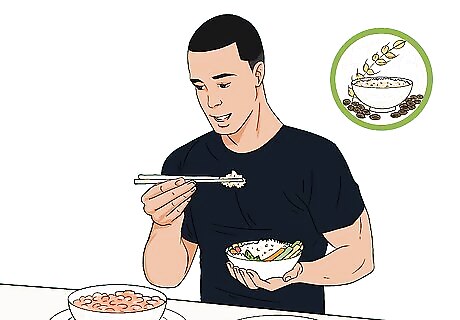
Eat a lot of calories. When your goal is to get bigger pecs and abs, you need a lot of fuel. That means eating five meals a day, not three, while you're in intense workout mode. You'll probably find it easy to eat this much when you're working out all the time. Be sure to stock up on healthy food so you never end up going hungry. Don't eat a lot of empty calories from refined carbohydrates, sugar and trans fats. Stay away from snack food and fast food. Instead, eat wholesome, high-calorie foods that fill you up and nourish your body. Get plenty of fruits and vegetables with every meal. Eat beans, brown rice, yogurt, whole grains, nuts, avocados, olive oil, and other nutritious foods.
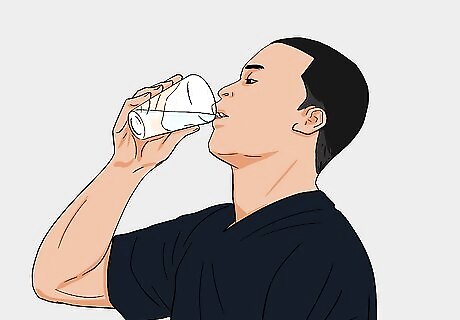
Drink plenty of water. It's important to stay hydrated when you're working out and eating a lot of calories. Aim for 10 glasses of water a day, rather than the commonly recommended 8.
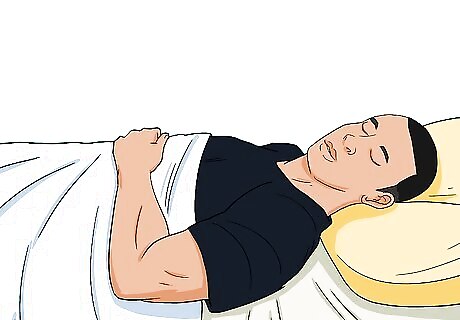
Sleep well. Resting is just as important as working out when it comes to building muscle. Get 7 to 9 hours of sleep every night, and on your rest days, do no more than a light walk, jog or another low-intensity activity.













Comments
0 comment